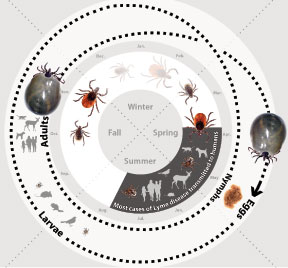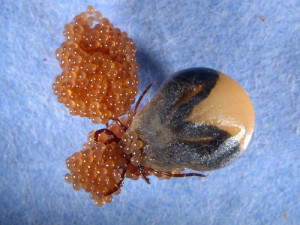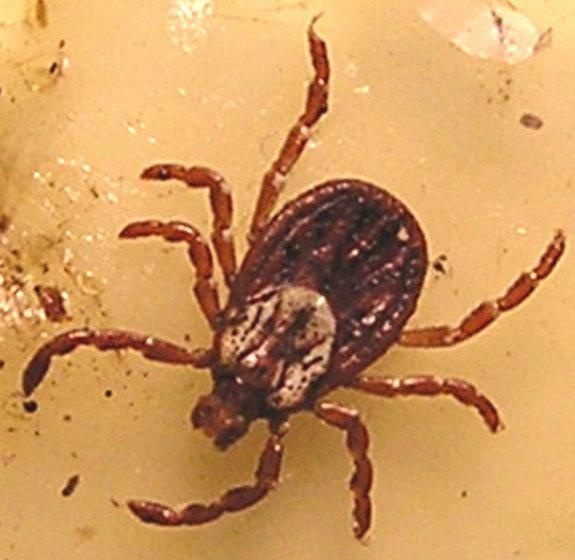Unfortunately, ticks also love summer in The Hamptons
As natives of the East End, we have seen an explosion of Lyme Disease, Erlichiosis,and other diseases transmitted by ticks to pets and humans. We have consulted with some of the most dedicated entomologists, scientists and doctors. There is too much misinformation, and we are dedicated to keep you informed of the continuing research and accurate information available. A favorite quote of scientists we have consulted with is “if someone says something long enough, people will actually believe it.”
Life-cycle of Ixodes scapularis (a.k.a. black- legged or deer tick) in the northeast/mid- Atlantic/upper mid-western United States.
 Larval deer ticks are active in August and September but these ticks are pathogen-free. Ticks become infected with pathogens when larvae (or nymphs) take a blood meal from infectious animal hosts. Engorged larvae molt over winter and emerge in May as poppy-seed sized nymphal deer ticks. Please note that most cases of Lyme disease are transmitted from May through July, when nymphal-stage ticks are active. Adult-stage deer ticks become active in October and remain active throughout the winter when the ground is not frozen. Blood engorged females survive the winter in the forest leaf litter and begin laying their 1,500 or more eggs around Memorial Day (late May). These eggs hatch in July, and the life-cycle starts again when larvae become active in August.
Larval deer ticks are active in August and September but these ticks are pathogen-free. Ticks become infected with pathogens when larvae (or nymphs) take a blood meal from infectious animal hosts. Engorged larvae molt over winter and emerge in May as poppy-seed sized nymphal deer ticks. Please note that most cases of Lyme disease are transmitted from May through July, when nymphal-stage ticks are active. Adult-stage deer ticks become active in October and remain active throughout the winter when the ground is not frozen. Blood engorged females survive the winter in the forest leaf litter and begin laying their 1,500 or more eggs around Memorial Day (late May). These eggs hatch in July, and the life-cycle starts again when larvae become active in August.
Courtesy of The University of Rhode Island
TICK & PEST CONTROL PROGRAMS
Protect your children, your pets, and yourselves from the potential harm caused by the infestation of ticks. It is important to get implement a tick pest control program, tailored to your needs. ORGANIC PROGRAMS AVAILABLE as well. This program can be hugely beneficial to you in the time that you spend here. Some people would rather use alternative methods to help them get rid of these pest problems once and for all. Somewhere similar to this pest control company in New Hampshire (https://www.pestcontrolexperts.com/local/new-hampshire/) could be a great place to look if you want to have a better chance of permanently exterminating ticks and other pests from your lives.
These ticks are back with a vengeance . Give us a call and we will help find you a solution. Even bring one to our office and we will identify it for you free of charge. We will also educate you because there is so much misinformation out there.(631) 726-6088
For further information on deer, deer diseases, as well as the possible ticks that they could carry, and more, have a look over at informational sites like feedthatgame.com and others.
